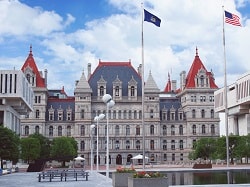New York Legislature Piles on Fines for Home-Share Listings

 New York Gov. Andrew Cuomo is currently reviewing legislation passed by the state’s Senate and Assembly that would establish new penalties for advertising one’s apartment for a short-term rental, a move that directly targets room-sharing services like Airbnb. The new legislation sets fines, from $1,000 for a first violation and up to $7,500 for a third and subsequent violations.
New York Gov. Andrew Cuomo is currently reviewing legislation passed by the state’s Senate and Assembly that would establish new penalties for advertising one’s apartment for a short-term rental, a move that directly targets room-sharing services like Airbnb. The new legislation sets fines, from $1,000 for a first violation and up to $7,500 for a third and subsequent violations.
As the Wall Street Journal points out, it has been against the law in New York City since 2010 for tenants to rent out entire apartments for less than 30 days, and that has not changed. One doesn’t have to actually contract for occupancy, though, to be in violation of the new legislation – the penalty is for anyone who advertises their apartment incorrectly. According to the text of the bill, penalties apply to anyone who tries to “encourage, persuade or manipulate” potential short-term renters via “newspapers, magazines, flyers, handbills, television commercials, radio, signage, direct mail, websites, or text messages.” Although phrased in a theoretically neutral way, it’s safe to assume that the vast majority of the listings that will be liable under this legislation will be on home-sharing websites and apps, not handbills distributed in Times Square.
The people providing the most vocal support for this legislation are, not surprisingly, the hotel owners with whom individual home-share users are competing for clients. Hotel Association of New York City chairman Vijay Dandapani was quoted on the legislature’s vote, complaining that Airbnb users “don’t follow any of the same regulations as legitimate hotels.” And that’s a good thing. First, Airbnb users aren’t operating hotels, and second, the answer to an overregulated incumbent confronting an innovative rival should be to deregulate the incumbent, not hobble the innovator. And even if existing regulations don’t budge, the pressures from less-regulated competitors produce significant consumer advantages, as we’ve seen in the case of Uber and the New York City taxi industry.
Along with the clearly self-interested hotels themselves, we have politicians and activists complaining of other alleged quality-of-life collateral damage, including that an increasing number of Airbnb rentals would be a threat to affordable housing in New York City. This is a persuasive argument only if you buy into the current Byzantine regime of zoning regulation which has made it so difficult and expensive to build new rental housing in New York City. According to the New York Times, nearly 40% of the existing buildings in Manhattan could not be built today because of current zoning restrictions. As has been said frequently regarding the cost of housing in San Francisco and other cities, you can have zoning rules that severely restrict new construction and the resulting high prices, or you can have fewer restrictions and lower prices. There is no “affordability agenda” that is going to square this circle, especially not on the scale of a major American city with millions of residents.
While home-sharing customers and companies will face a significant setback in New York City if Gov. Cuomo decides to sign this legislation into law, the generally uber-positive attitudes millions of Americans have regarding the sharing economy provide ample cause for optimism.